Leah Libresco Sargeant Takes on "Pope Francis’s Muddled Mercy."

In an article posted to First Things, Leah Libresco Sargeant reflects on the legacy of Pope Francis.
In her recent article, "Pope Francis’s Muddled Mercy," Leah Libresco Sargeant offers a scathing reflection on the ministry of Pope Francis through the lens of the central theme of the late Pope's ministry: mercy.
While acknowledging his personal acts of compassion, Sargeant argues that the Pope's public witness to mercy was often confused, selective, and at times dangerously misapplied—especially in cases involving serious moral wrongdoing. She distinguishes between the modern sentimental notion of mercy as mere kindness and the Christian understanding of mercy as a love that calls the sinner to repentance, a mercy that coexists with justice, not in opposition to it.
At the heart of her critique lies a tension between the public perception of Francis’s “merciful” image—embodied in soundbites like “Who am I to judge?”—and the deeper Christian imperative to name sin truthfully in order to heal it. Sargeant highlights the troubling leniency shown to abusive clergy such as Zanchetta and Rupnik, where the Pope’s so-called mercy functioned more as institutional shielding than pastoral care. She insists that true mercy demands accountability and conversion, not concealment.
Key to Sargeant's reflection is this: that mercy is divine power that heals what is broken—precisely because it does not ignore the fracture. In Orthodoxy, mercy (eleos) is inseparable from truth. The liturgical cry, "Lord, have mercy," is not a request to avoid consequences, but a plea for transformation. Christ’s mercy is cruciform: it reveals sin, bears it, and conquers it. It does not affirm us in our brokenness; it raises us from it.
Sargeant’s article is a sober reminder that pastoral charity without moral clarity is a counterfeit mercy. The world does not need a Church that merely soothes guilt but one that calls all, guilty and wounded alike, to the transforming light of Christ’s mercy, where judgment is not avoided but transfigured through repentance.
Read Sargeant's full critique here.









